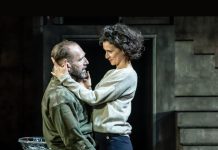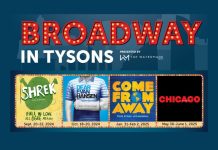
First of all, I cannot thank Director Kevin Kuchar enough for allowing me the privilege to play this role, especially at such a young age. It’s an especially unique opportunity for me because I’ve never played a character that actually existed at one point. They’ve all been fictional so far, so this drastically changed how I approached my process.
I started with extensive research on the topic, making sure I knew the facts of the case like the back of my hand. This story is very close to home for me, especially considering the fact that my grandmother is and my grandfather was a Holocaust survivor, so I knew I had to make sure my performance was as realistic as possible. If I was going to play Leo Frank, I was going to do it right. I feel like that is the least I could do to pay true homage to this incomparably brave man. I tried to find as much information about who he was as a person, and I closely examined the few photographs of him in existence to get a good idea of who this guy really was. One big challenge for me in playing Leo that Kevin pointed out to me in the beginning is that he is unbelievably shy and reserved. I’m accustomed to playing more outspoken, bravado-filled men, so that was definitely something I had to work on a lot.
As far as Jason Robert Brown’s score is concerned, I am absolutely in love with it, and am so appreciative that I have the opportunity to sing such wonderful music. With that opportunity however, comes an excruciating deal of difficulty. Brown’s rhythms are exact to a tee, with a ton of syncopation. It takes several tries to simply get the rhythms down in a few measures, so imagine how much time it takes to master the rhythms in an entire song. While the rhythms are confusing at times, maintaining the vocal line with his accompaniment playing under you is ten times harder. Most of the time, the accompaniment does not give the singer any helpful hint as to where they are in the song or if they’re even singing the right pitches.
Don’t get me wrong, the moments of dissonance in Brown’s score, while they may not help the singer, make perfect musical sense, and reflect the intentions of what the character is saying beautifully, it just takes a highly advanced level of skill to learn and perform it all correctly. With that in mind, I had to ensure I knew which beats lined up with my entrances, and completely memorize my rhythms and vocal line before putting it together with the accompaniment. That way, once I was practicing it with the accompaniment during music rehearsals, if I felt I was going to get lost, I could just trust the fact that I knew I was coming in at the right place and singing the right notes even though I couldn’t quite fit it together in my head with the accompaniment at the time.
After all that work, it was a very rewarding feeling to finally feel that I had mastered my musical part, and that it all made sense to me.
Aside from my individual journey with this show, I have had such a great time working with my cast mates, especially my two Lucilles, Amanda and Audrey. Leo and Lucille have a dysfunctional relationship throughout the show’s journey, and the fact that they were able to come together and find their true love for one another right before Leo is killed is one of the show’s most devastating tragedies. In order to portray that unbreakable bond built by times of distress, I felt we had to have close relationships outside of the rehearsal hall. Interestingly, while I was great friends with them both already, it wasn’t our desires to put on a good show that forced us to become even closer. It was actually the show itself, and the work itself we were doing that helped us bond and connect with each other as two human beings. The fact that Leo and Lucille had the power to bring us so much closer together as people really communicates how powerful this musical truly is. It has the capability to unite people and prevent future acts of hate.

This isn’t just a musical. It is a peaceful service to mankind. I love them both dearly, and I could not have asked for two more wonderful people to share this emotional journey with. It is an absolute honor to be able to perform in the Kogod Cradle at Arena Stage, and I cannot thank the Arena staff more for giving us this incredible opportunity. I thought it was already amazing that they allowed us to perform Next to Normal in one of their rehearsal spaces last year, but this is just a whole new level of awesomeness. I am so grateful for this opportunity and for everyone who made it possible, and I can’t wait to see everyone at the show!
LINK
Amanda Silverstein on Playing Lucille Frank in Act Two @ Levine’s ‘Parade’ This Weekend at The Kogod Cradle at Arena Stage.
______
All seating is general admission and all tickets will be held at will call. All ticket sales are final.
Performances:
Friday, January 30th, 2014 – 7:30 PM
Saturday, February 1st, 2014 – 2:00 PM
Saturday, February 1st, 2014 – 7:30 PM
Sunday, February 2nd, 2014 – 2:00 PM
Tickets:
$19 General Admission (advance purchase)
$17 Students/Seniors (advance purchase)
$20 at the door
Purchase tickets online:
Location:
Arena Stage at the Mead Center for American Theatre
in the Kogod Cradle
1101 6th Street, SW, in Washington, DC.
Here are directions.






